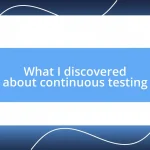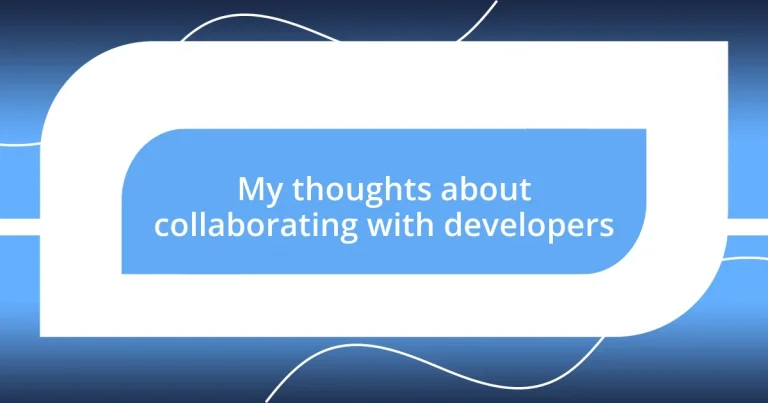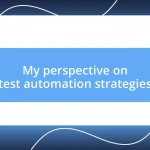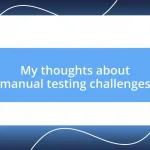Key takeaways:
- Collaboration bridges the gap between creative ideas and technical execution, enhancing creativity and fostering innovation.
- Key skills for effective collaboration include clear communication, adaptability to changes, and active listening to foster inclusivity.
- Building lasting relationships with developers relies on trust, transparency, and celebrating successes to strengthen team morale and connections.
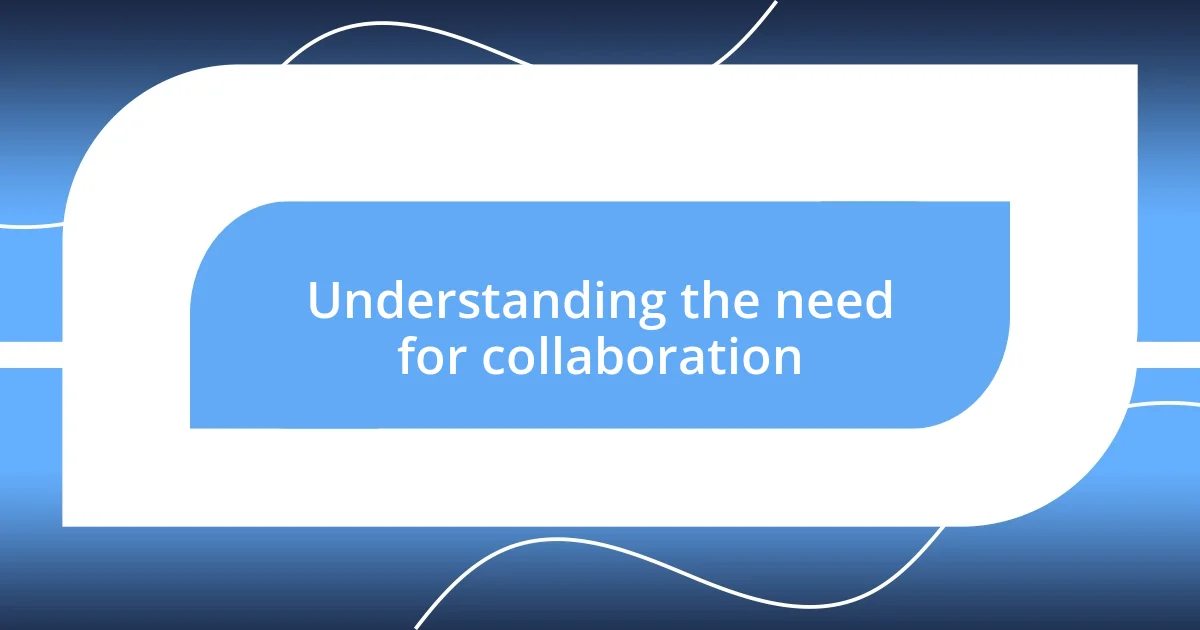
Understanding the need for collaboration
Collaboration with developers is essential because it bridges the gap between creative ideas and technical execution. I remember when I was working on a project that looked promising in my mind but fell flat in reality. By teaming up with a developer, I learned how to refine my concepts to fit what was technically feasible. Have you ever experienced a moment where a collaborative effort brought something to life that you thought was impossible?
It’s intriguing to think about how our unique strengths complement each other in a collaborative setting. Early in my career, I hesitated to involve developers in the design process, believing I could manage it alone. However, one project challenged that mindset. When I finally opened the door to collaboration, I was amazed at how their insights transformed my initial vision into something far greater. Isn’t it fascinating how different perspectives can lead to unexpected and innovative solutions?
Understanding the need for collaboration isn’t just about achieving goals—it’s about fostering a shared sense of purpose. I recall a time when my team faced a tight deadline and high stress. But, as developers and I pooled our talents and resources, an unexplainable energy filled the room. That feeling of unity made the entire process enjoyable, reminding me that collaboration nurtures not just outcomes but relationships. How do you feel when you work together with others towards a common goal?
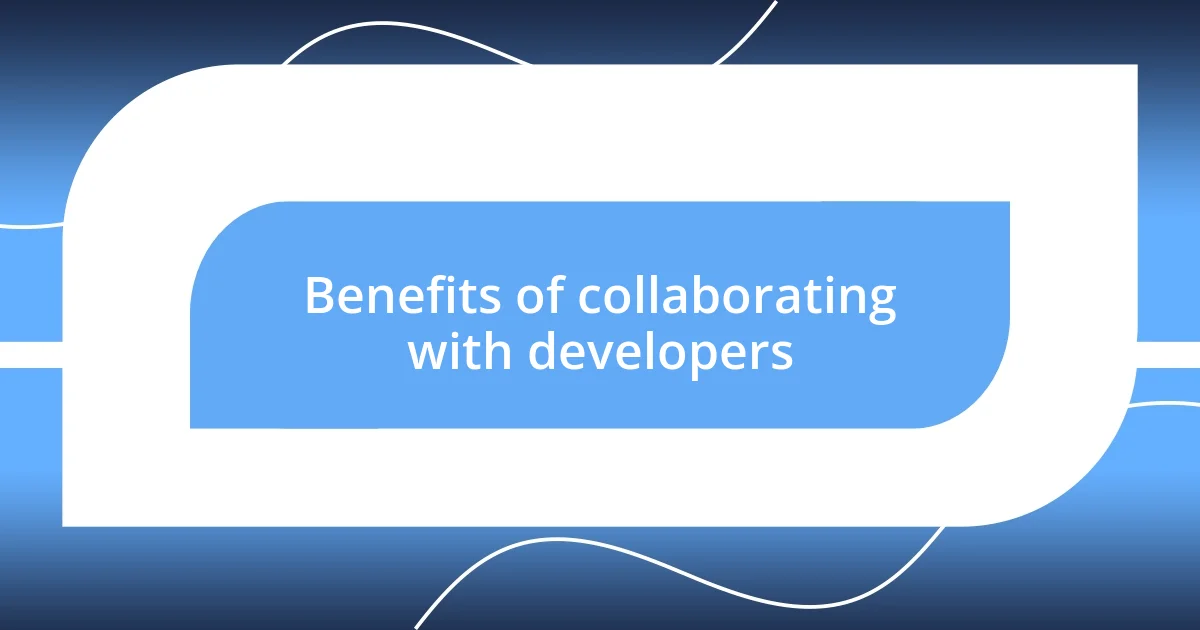
Benefits of collaborating with developers
Collaborating with developers can unlock a treasure trove of benefits that enhance both the process and the final product. I recall a project where I partnered with a skilled developer, and it was eye-opening. Through our discussions, I grasped not only the technical feasibility of my ideas but also learned to think differently about problem-solving. Working together provided immediate feedback, which sped up the refinement process and significantly improved our product.
Here are a few key benefits I’ve experienced when collaborating with developers:
- Enhanced creativity: Their technical insights often spark new ideas I wouldn’t have considered on my own.
- Improved efficiency: With developers involved early, we can streamline processes and reduce back-and-forth revisions.
- Shared expertise: Combining our skills leads to a more comprehensive understanding of the project’s needs.
- Fostering innovation: Collaborative brainstorming sessions often yield solutions that blend creative and technical elements seamlessly.
In one memorable instance, a developer turned my initial concept for a web app into something both visually appealing and functionally robust by suggesting practical approaches. It was not just about coding; it felt as if we were sculpting a piece of art together. That experience reiterated to me how collaboration not only elevates the output but also makes the journey exhilarating. Have you ever found yourself caught in that thrilling space where two minds meet in a shared vision?
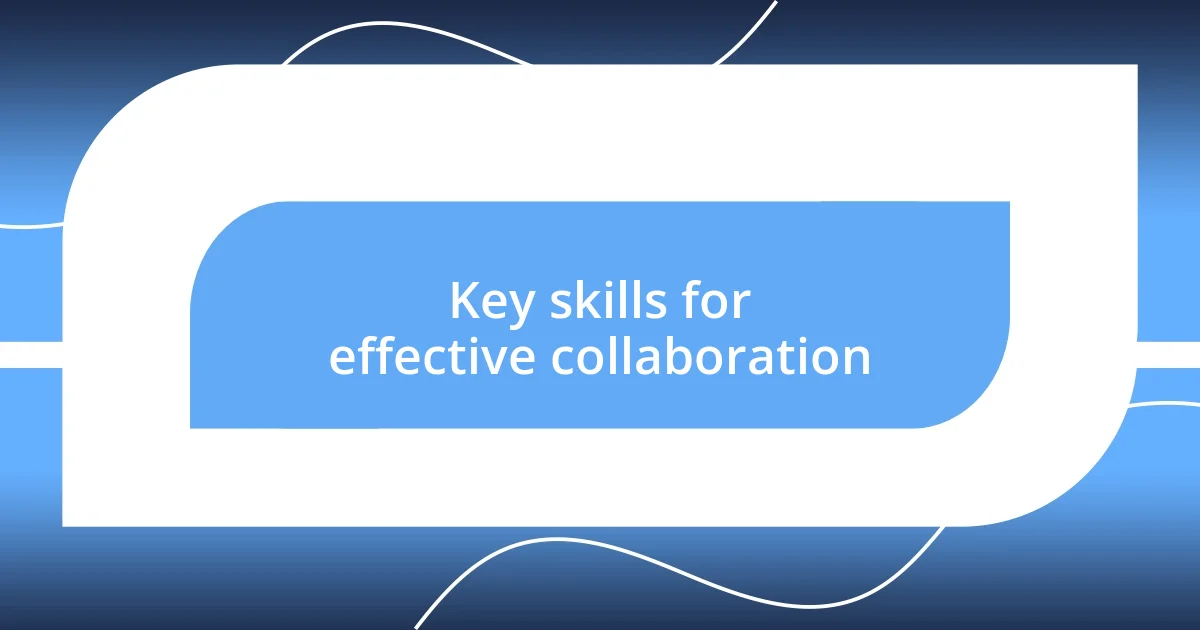
Key skills for effective collaboration
Effective collaboration hinges on clear communication. I remember a pivotal moment in a project where miscommunication nearly derailed our progress. By establishing regular check-ins and openly sharing our thoughts, we turned potential confusion into a streamlined workflow. Have you ever experienced how clarity in conversations can transform collaboration?
Another vital skill is adaptability. During one project, plans shifted unexpectedly due to client feedback. Being flexible allowed my developer partner and me to pivot quickly without losing momentum. This adaptability not only saved our timeline but also enriched the final product. How do you handle unexpected changes when working with others?
Lastly, active listening stands out as a cornerstone of successful collaboration. I’ve learned that truly hearing others’ ideas fosters an inclusive environment. In a previous collaboration, I focused intently on my developer’s thoughts, and it opened up a dialogue that led to innovative solutions we hadn’t initially imagined. Have you noticed how active listening can create a deeper connection in teamwork?
| Skill | Description |
|---|---|
| Communication | Sharing information clearly and effectively to prevent misunderstandings. |
| Adaptability | The ability to adjust to new conditions and feedback during the project lifecycle. |
| Active Listening | Engaging fully with what others say, fostering inclusivity and creativity. |
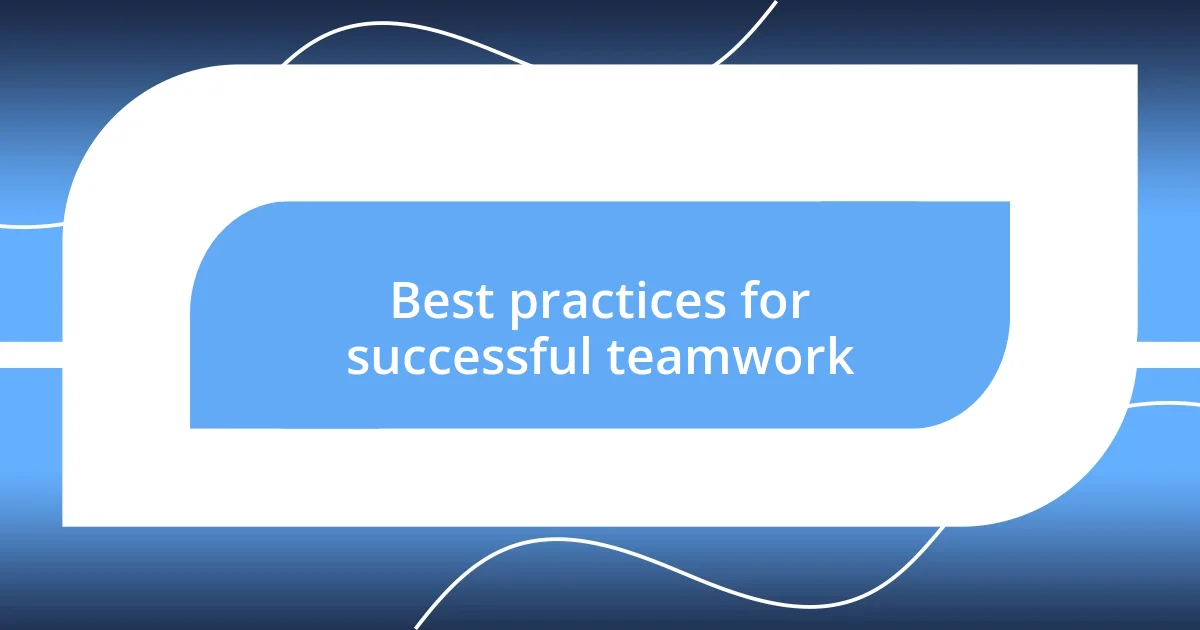
Best practices for successful teamwork
One of the best practices for successful teamwork is setting clear expectations from the outset. In my own experience, when a project starts without clearly defined roles and responsibilities, confusion often reigns. I remember a time when I assumed my developer partner would handle a specific technical aspect, only to find out later that they were waiting for my input. That lost time could have easily been avoided with open conversations upfront. Have you ever had a similar misalignment on a project?
Another crucial aspect is embracing regular feedback loops. In a previous collaboration, we dedicated a specific time each week to share our thoughts on progress and hurdles. This practice not only kept us aligned but also fostered an environment where we felt safe to express challenges. The candid conversations led to adjustments that significantly improved the project trajectory. How often do you check in with your team to ensure everyone is on the same page?
Finally, celebrating small wins can greatly enhance team morale. I recall a project milestone we achieved earlier than expected. We took a moment to acknowledge that success together, which energized us for the next phase. It created a sense of camaraderie that made challenges seem more manageable. Have you noticed how a little celebration can lift spirits and boost productivity?
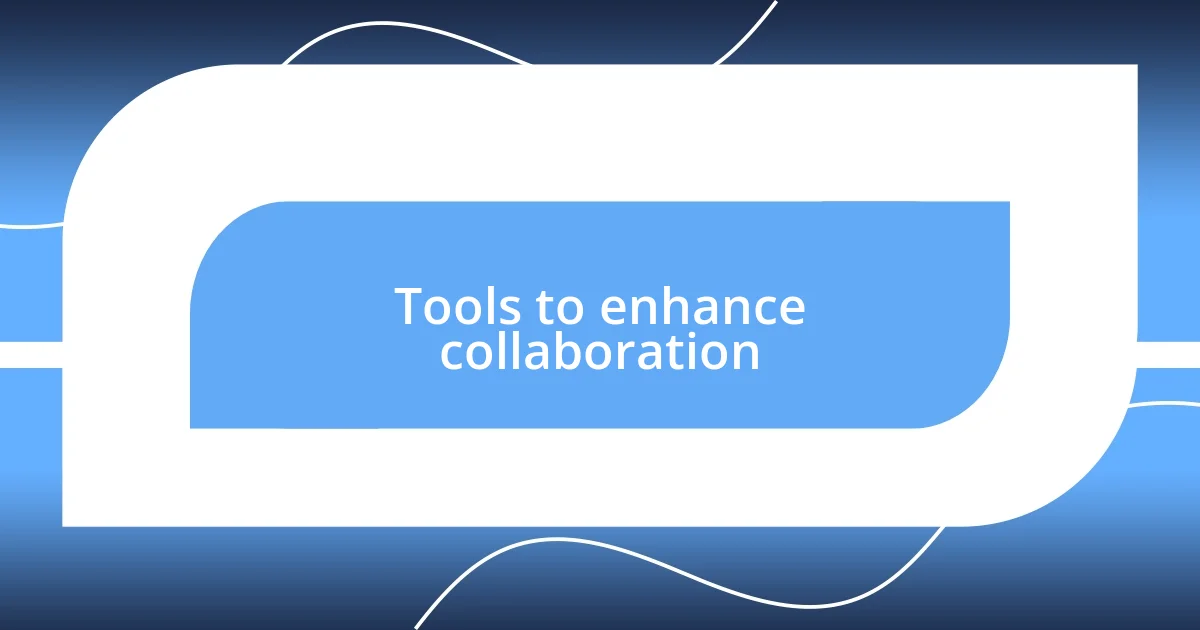
Tools to enhance collaboration
Choosing the right tools for collaboration can make all the difference in a project. I’ve found that platforms like Slack help maintain fluid communication, allowing us to share updates or ideas in real time. Did you know that creating dedicated channels for different topics can dramatically reduce noise and keep everyone focused on what truly matters?
Additionally, project management tools such as Trello or Asana offer visual ways to track tasks and deadlines. I remember when my team implemented Trello; the clarity it brought was remarkable. We could visualize our workflow and easily identify bottlenecks, which empowered us to address issues proactively. How often do you find yourself lost in a sea of tasks without a clear overview?
Lastly, utilizing collaborative coding environments like GitHub can significantly enhance developer teamwork. In my experience, the version control features not only help in tracking changes but also facilitate peer reviews seamlessly. Have you ever experienced that “aha” moment when a colleague suggests a tweak that elevates your code? It’s moments like those that highlight the true power of collaboration tools.
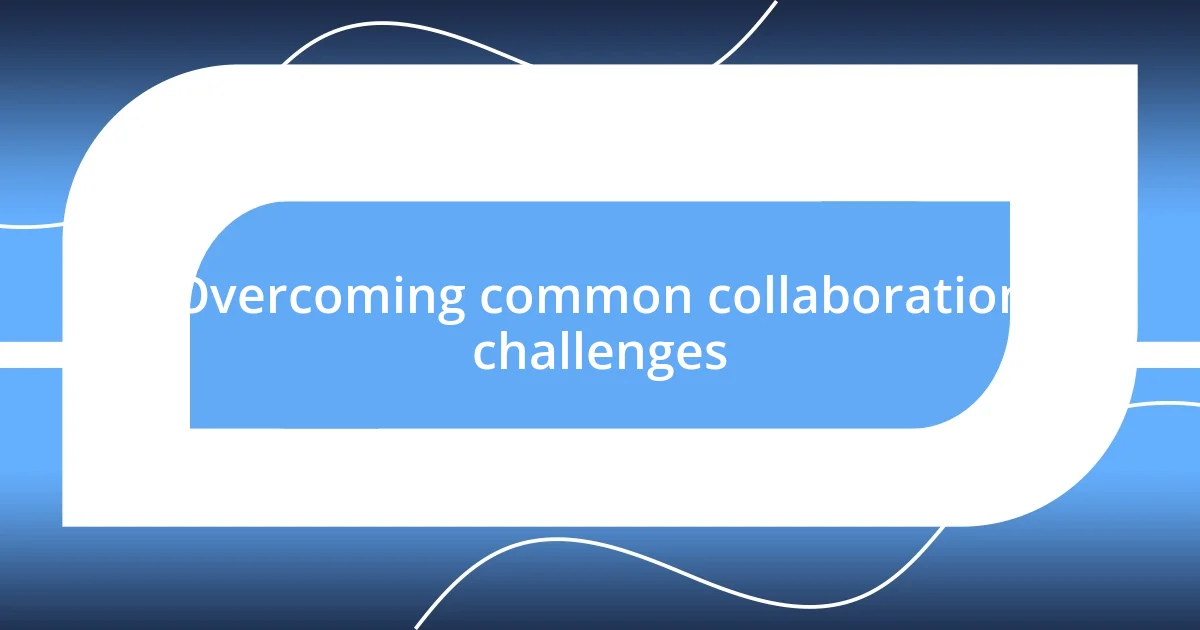
Overcoming common collaboration challenges
Collaborating with developers can sometimes feel like navigating a maze, especially when it comes to communication hiccups. On one project I worked on, we faced misunderstandings due to differing terminology. I remember feeling frustrated when I was on a call, only to discover that terms I thought were common were interpreted differently by my developer partner. This experience taught me the importance of establishing a shared vocabulary early on—I now always try to clarify key terms from the get-go. Have you ever found yourself in a situation where assumptions led to confusion?
Another challenge is dealing with varying work styles, which can create friction if not addressed. In one collaboration, I was used to a fast-paced approach, while my developer preferred meticulous planning. Initially, this caused tension, but we eventually found common ground by openly discussing our preferences. Adapting to each other’s styles allowed us to create a workflow that combined speed with thoroughness. How do you and your collaborators find a balance between different working approaches?
Lastly, managing deadlines can be tricky, especially when technical hurdles arise unexpectedly. I recall a time when we underestimated the time required for a critical feature, which pushed back our entire timeline. The stress of that week was palpable, but it also sparked an honest conversation about buffer time and realistic planning. Now, I always advocate for including extra time in our schedules because it helps ease the pressure when challenges inevitably pop up. Have you ever experienced the relief that comes from having a little wiggle room in your deadlines?
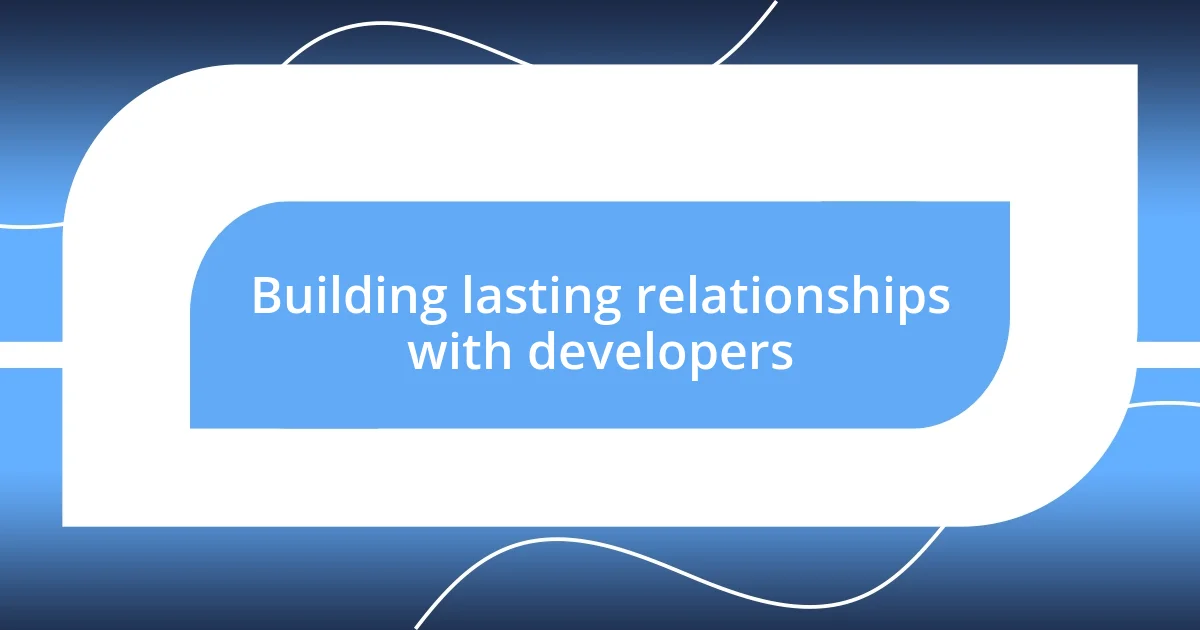
Building lasting relationships with developers
Building lasting relationships with developers hinges on trust and transparency. I once collaborated with a developer who shared not just updates, but also their concerns about project hurdles. That vulnerability opened the door for genuine dialogue, allowing us to address issues proactively. Have you ever noticed how little sparks of honesty can turn a project into a partnership?
Another aspect I’ve found crucial is the celebration of success, no matter how small. In one project, after completing a significant milestone, our team decided to have a casual team call to reflect on what we accomplished. It was amazing to see how that moment of recognition not only boosted morale but also fostered a sense of community. Don’t you think that acknowledging hard work can strengthen ties among team members?
Listening is an underrated skill in building these relationships. I remember a time when I just absorbed feedback from my developer without offering my perspective. It wasn’t until later that I realized my silence might have felt dismissive. Now, I make it a point to engage in discussions where both sides feel valued. Have you ever felt the difference when someone truly listened to you? That connection can be a game-changer in collaborative environments.









